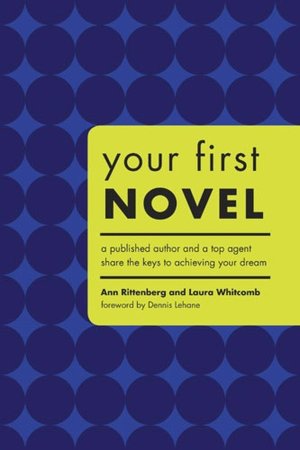Your First Novel by Ann Rittenberg and Laura Whitcomb; Writing the Breakout Novel Workbook by Donald Maass
.
Today I am doing two different writing books. One I read years ago when I first started focusing on writing novels but over the past few weeks have been re-reading. The other is one I bought from amazon last year and have read off and on whenever I feel like checking it out. Both of the books work for the same audience but they are definitely different.
Having read a few writing books over the last 5 years, I have started to glaze over when reading them because there is only so many times I can read things like the difference between first and third person, who is a protagonist and other basic information. On the other hand, I am always learning something new.
Your First Novel by Ann Rittenberg and Laura Whitcomb
Section 1 - Writing Your Novel
This section focuses on, as you can tell, the writing end which is more than just the first draft. This is from preparations to writing to editing and more.
Section 2 - Publishing Your Novel
This section is focused on traditional publishing. Topics discussed included what a literary agent does, query letters, and publication day and beyond.
Throughout examples are provided by both authors to illustrate different points.
I purchased this book when I first started focusing on novels and for good reason since the title of the book is "your first novel." Also, what caught my attention about this book was it went beyond how to write the first novel to tips from an agent, which sounded cool and useful. The book discusses so many things in the less than 300 pages of the paperback book, so it might lack some in depth focus on all of the topics, however, it provides a broad basis for a writer to start with when learning to write. From there the reader could jump to a more focused book.
Reading the book over again, I find myself glazing over when reading certain section. Also, I sometimes skip the examples because they are small snippets of books I have never read. It's rare in a writing book to use something I've read as an example but there are a few. One thing that is fun about this book is that at the end of chapters there are recommended readings and some even have web sites and movies suggested. This is good for beginners but would also be a good refresher for veterans too.
Writing the Breakout Novel by Donald Maass
From Goodreads: Noted literary agent and author Donald Maass has done it again His previous book, "Writing the Breakout Novel," offered novelists of all skill levels and genres insider advice on how to make their books rise above the competition and succeed in a crowded marketplace.
Now, building on the success of its predecessor, "Writing the Breakout Novel Workbook" calls that advice into action This powerful book presents the patented techniques and writing exercises from Maass's popular writing workshops to offer novelists first-class instruction and practical guidance.
This is the first "workbook" that I've purchased as far as writing is concerned. I haven't actually read the book that inspired the workbook, so don't know if that factors into anything.
It is an extensive workbook but some of the topics were a bit lost on me, or so I felt. There are some things in writing that not everyone will do the same. For me, character building is one of them. I even noticed this when talking to a friend, as I looked up the section of the book because he was wanting help on developing characters. For now, all I've done is ponder some of the exercises presented in the book but I might try some of them in the near future.
This book is definitely something for a person who liked a hands on approach to learning. Reading advice on writing has its place but there has to be a time to put pen to paper (or fingers to keyboard) and this book is good step to learn how to do certain aspects of writing before taking that information to use it in a novel. It might be a good idea to check out the original book, Writing the Breakout Novel for those that are less of a hands-on approach type. This is not my favorite book on writing but it's something that I would recommend friends to at least look at and consider.
Thursday, February 09, 2012
|
Labels:
nonfiction,
writing
|





1 comments:
Hi Dawn. This was one of the first how-to books I read. I learnt more than I've ever learnt since.
Great review.
Denise
Post a Comment